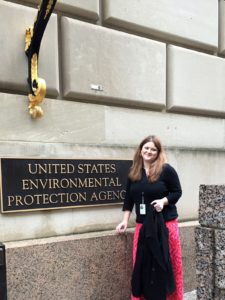In a special weekly series, the College of Liberal Arts is featuring a faculty member from one of our 13 departments. We asked questions about why they are passionate about the subjects they study and teach, and how they found their path to CSU. See all “Faculty Friday” features here.
Susan Opp
Associate Professor, Department of Political Science
 1. What inspired your interest in political science?
1. What inspired your interest in political science?
My interest in political science started as an undergraduate student when I took my first public policy course in the political science department at the University of Colorado. I spent most of my childhood in south Georgia in a community that faced significant poverty and economic decline. The lessons I learned as a child in this environment have driven me to want to contribute to problem solving for communities and people.
I selected economics as an undergraduate major because I thought it was the best path for me to learn about ways to solve these wicked problems. However, once I was introduced to public policy, I realized the interdisciplinary nature of political science and public policy was a far better fit for me to understand ways to solve complex public problems.
2. Which class is your favorite to teach and why?
My favorite class to teach is POLS 463 Urban Policy and Management. In this class I get to lead students on a journey that helps them understand local problems, local policymaking, and ultimately local solutions. This is the ultimate problem-solving class with a real world laboratory to work with!
I get to teach about some of the most complex local problems in the United States such as gentrification, residential segregation, land use planning, economic development, and mobile capital concerns. I use examples from all over the United States when I teach this class and because of how rapidly local issues change, this class is always a bit different each time I teach it.
For example, last fall semester Amazon had just started their process of identifying a second headquarters. This ongoing news story allowed us to understand local economic development, political fragmentation, and local competition through this specific and interesting case! Other semesters I have been able to focus on topics like sexually-oriented business regulation, affordable housing, homelessness, and corruption due to events occurring at that time. It is a really fun class that provides students with insights into local government and local policy in ways that I hope they take with them for the rest of their lives.
3. What did you want to be when you were little? When did you know you wanted to go into higher education/research?
My initial plan was to become an attorney. My family always said I was good at arguing and that I should go to law school. At the same time, I think I also fell into the common trap of thinking that law school is one of the only ways to make a liberal arts degree work for a career. I am very happy that I changed my path and ended up as a professor.
Near the end of my undergraduate program, it was increasingly clear that my true passion was public policy and public administration. As a result, I went on to begin a Master of Public Administration (MPA) degree in Kentucky with the plan to pursue a career in local public management. I was fortunate enough to be invited to interview for two assistant to the city manager jobs in my last semester of my MPA program. Once I was offered those positions and learned more about the realities of those roles, I was able to really understand that I was not comfortable with the level of politics involved in managing a city. To be honest, I am far too self-critical to work in an environment where my decisions – good or bad – could end up on the front page of the newspaper!
Thankfully, I had a backup plan and was connected with a research center at the University of Louisville that focused on local environmental issues. They also offered a Ph.D. in Urban and Public Affairs. This program trained me to be what is called a “pracademic.” A pracademic is someone that works in higher education as a professor, but has a substantial connection to the practice of public policy and administration. I am able to work with the students that I love, research topics that have problem-solving aspects, and still work with the public sector without ending up on the front page of the newspaper! It truly is the most ideal situation for someone that loves local policy, but also loves research and teaching.
4. How did you get to CSU?
My first faculty job after graduate school was at Texas Tech University. I spent two years in Lubbock, Texas before CSU advertised a need for a public policy faculty member in the Department of Political Science. Although I am originally from Georgia, my family moved to Colorado when I was in middle school and I graduated from Fort Collins High School. Fort Collins is my second home. I was so excited to have an opportunity to return to Fort Collins and work with such great students! I have been at CSU since 2009.
5. What is one thing students would be surprised to learn about you?
My students might be surprised to learn that I hate wearing shoes. If they were to peer behind my desk during the spring and summer months, it is quite likely that I won’t have shoes on!